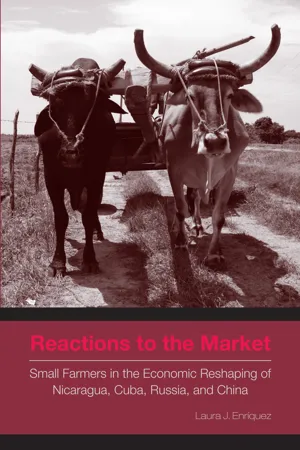
Rural Studies
Small Farmers in the Economic Reshaping of Nicaragua, Cuba, Russia, and China
- English
- PDF
- Available on iOS & Android
Rural Studies
Small Farmers in the Economic Reshaping of Nicaragua, Cuba, Russia, and China
About This Book
It is manifest in developing countries around the world that the "shock" therapy administered to their economies by the neoliberal model of structural adjustment has failed, leaving much social and economic destruction in its wake. In Latin America this failure has led to a resurgence of interest in alternative models, some of them deploying various versions of socialism, as in Bolivia, Chile, and Venezuela, which has given rise to talk about the new "pink tide" enveloping the region. In this comparative study of four economies that have been making a transition to the market from their orthodox socialist pasts, Laura Enríquez focuses our attention on the plight of the small farmer in particular and on the importance of this sector for the overall socioeconomic success of the transition.
Through this comparison, we see the similarities between Nicaragua and Russia in their rapid retreat from socialism and their adoption of reforms that have placed small agriculture, especially that focused on food crops, at a distinct disadvantage relative to export-oriented production. By contrast, Cuba has been more like China in adopting aspects of market reform while emphasizing small-scale cooperative and private farming in an effort to achieve food self-sufficiency.
Drawing insights from Karl Polanyi's study of the social and economic effects of the expansion of market relations in the nineteenth century, Enríquez highlights the role of the state in each of these countries in driving change in a certain direction: toward de-emphasis of small-scale farming and the eventual assumed demise of the peasantry in Nicaragua and Russia, which has led to countermovements of peasants struggling to survive, and toward the reconfirmation of the value of small farming in contributing to balanced economic development in Cuba and China.
Frequently asked questions
Information
Table of contents
- Front Cover
- Title Page
- Copyright
- Contents
- List of Figures, Tables, and Maps
- Acknowledgments
- Abbreviations and Key Terms
- Introduction
- Part I: Transitions from Socialism and Their Social Consequences
- Part II: Nicaragua's Rapid Retreat from Socialism
- Part III: The Reconfiguration of Cuban Socialism
- Conclusion: Transitions Toward the Market and Their Theoretical Implications
- Postscript
- Appendix A: A Note on the Use of the Terms SMALL FARMER and PEASANT
- Appendix B: My Research Methodology
- Bibliography
- Index
- Back Cover